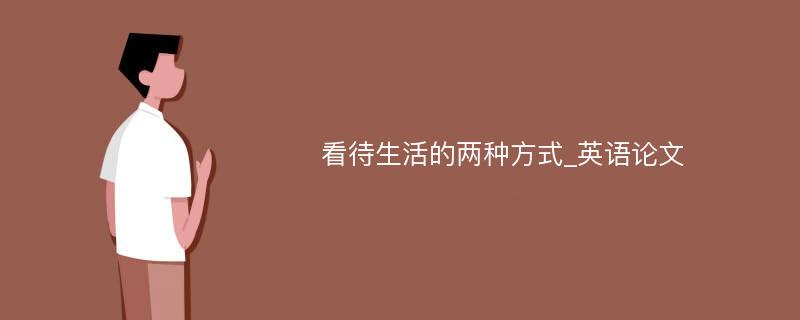
看待生活的两种眼光,本文主要内容关键词为:两种论文,眼光论文,此文献不代表本站观点,内容供学术参考,文章仅供参考阅读下载。
Your attitude strongly reflects your outlook on life.Takea closer look at that connection.Are you a pessimist-or anoptimist?Can you see how your way of looking actually doescolor your attitude?And remember:change your outlook and youchange your attitude.
这篇小品文以一对性格迥异的夫妇在初得爱女时的不同反映为楔机,用对比的手法和幽默轻松的笔调勾勒出乐观者和悲观者的生活态度及其可能造成的影响。
文中讲到的这一对年轻夫妇,丈夫是一个终日患得患失的悲观者,即使面对出生不久的女儿,也只有片刻的欢喜。转瞬他就沉入不详预感的深渊:女儿难道是个聋子?难道因为自己祖父的失聪,可爱的女儿也不能听到种种美妙的声音?在等待医生诊断的过程中,他唉声叹气、坐立不安,什么事情也做不好。到头来,诊断还未出来,他就已经绝望。而个性乐观的妻子一开始就采取相当积极的态度,坚信孩子没有残缺,还理智地安排女儿到儿科医生那里就诊,在等待过程中,她没有忧心忡忡,而是尽心尽力地做着自己的工作,享受着现在的生活。结果自然是孩子无恙。然而可怜的丈夫还是不能安心,直到孩子被巨响吓哭,他才确信自己的女儿是正常的。
作者对悲观者和乐观者进行对比研究已经有25年。他借开题的这个例子生动地描述了自己的研究结果。于是,接下来,他顺理成章地用简洁明确的语言概括了两者的特点,他们在生活中同样处境下的不同反映,以及可能会造成的不同的结局。文章结尾略带调侃地说:Pessimistic prophecies are self-fulfilling.意思是说,悲观者整日尽想着可能会发生不好的事情,行动上也就受了影响,那些不好的事情自然也就因此而发生了。
作者既然是以深入浅出为写作目标,在词句的选择上也就格外偏重那些构造简单而又词义丰富的常规用词,使文章读来仿佛是在茶余饭后的一点闲聊,清淡而隽永。其实,真正要学好英文,这些常规用词正是英语学习者应该把握的关键。我们不妨在读每一篇新文章的时候,选择文中的一两个这样的词,多下点工夫。日积月累,也是一笔不小的财富呢。
例如,在小引中作者说:Can you see how your way of lookingactually does color your attitude?句中的color一词的用法就很活。我们对名词color都不陌生,但这里它却是一个动词,意思是:toaffect sth,那么这句话的意思就可以解释为:Can you see howyour outlook of life in fact does affect your attitude?如果我们再仔细阅读字典上的解释,就会发现当color用做此意时,贬义居多,且多用被动语态,因此,我们还可以造这样的句子:Don't let yourpersonal prejudice color your judgement.He gave a highlycolored account of the affair。而且动词color还有别的词义:
1.To make something colored rather than just black,white,or plain:Do you color your hair or is it naturally red?
2.To change color:It is autumn and the leaves arebeginning to color.
3.To become red in the fact;to blush(at sth):She coloredat his remarks.
第19段中有这样一句话:The optimist,who are confrontedwith the same hard knocks of this world,think aboutmisfortune in the opposite way.
句中knock一词的用法也很活。大家可以用举一反三的办法来试一试。
除了留心一词多义的情况,我们还要小心同义词(组)的细微差别。例如,在该文中出现了三个词组:apt to,prone to和tend to。三个词组都有“易于”“倾向于”的意思。但是具体看来,似乎又有所不同。我们先来看它们在文章中是怎样用的:
He is prone to depression.(paragrah 18)
……they tend to believe bad events will last a long time……(paragraph 19)
When optimists run for office,they are more apt to beelected than pessimists are.(paragraph 20)
但是显然三个词组是不宜交换位置的。那么我们就去请教一下字典吧。原来它们的具体意义是不同的:
1.apt to do sth:having a natural tendency to do sth:这是一个形容词词组,而且意义较为中性。所以可以用做文章中那个句子,也可以找到这样的例句:Some of the staff are apt to arrivelate on Mondays.
2.prone to sth/prone to do sth:likely to do sth or sufferfrom sth,esp sth bad or harmful:这也是一个形容词词组,但是用法较为灵活,可以带名词,也可以带动词词组。而且,词义上多隐含有不太好的倾向。例如:Some plants are prone to a particulardisease.又如:Kids are all prone to eat junk food.
3.tend to do sth:often do a particular thing,esp sth thatis bad or annoying,and to be likely to do it again.原来它比前两个词组的倾向性更重,而且贬义多。从词性上讲,它是一个动词词组。例如:Sally tends to interfere in the other people'sbusiness.The car does tend to overheat.
这样一比较,就清楚多了,而且因为读到更多例句的缘故,就更了解它们不同的用法,更牢固透彻地掌握了这些词组。
这篇文字平朴的文章中,还有很多值得我们仔细琢磨的词组。大家可以用探索的目光来把玩一番,这也是阅读的一种乐趣。
既然是文章,就要从篇章整体来体味全文。作者的写作方法也是很值得借鉴的,写得很规整,几乎每一段都可以找到一个主题句(topicsentence),段内的逻辑也很严谨,同时又不失活泼,从选材上弥补了科普题目容易枯燥乏味的缺憾。贯穿全文的对比写法清晰明了,对主题的提示起了很重要的作用。建议大家读完全文后,也用对比写法来写一篇小习作。像书法中的临摹一样,这样的苦工夫也是必要的。
作者的观点是很明确的,人们应该采取乐观的态度来看待人生,不要杞人忧天,庸人自扰,因为我们的人生观会影响我们的行为举止和做事方法,也就会决定我们能拥有一种怎样的生活。朋友们,你在读完这篇文章之后,会不会反观自己的人生观,重新做一番取舍呢?
1 The father is looking down into the crib at hissleeping newborn daughter,just home from the hospital.Hisheart is overflowing with awe and gratitude for the beauty ofher,the perfection.
2 The baby opens her eyes and stares straight up.
3 The father calls her name,expecting that she will turnher head and look at him.Her eyes don't move.
4 He picks up a furry little toy attached to the rail ofthe crib and shakes it,ringing the bell it contains.Thebaby's eyes don't move.
5 His heart has begun to beat rapidly.He finds his wifein their bedroom and tells her what just happened."Shedoesn't seem to respond to noise at all,"he says."It's as ifshe can't hear."
6 "I'm sure she's all right,"the wife says,pulling herdressing gown around her.Together they go into the baby'sroom.
7 She calls the baby's name,jingles the bell,clapsher hands.Then she picks up the baby,who immediately becomeslively and makes happy sounds.
8 "My God,"the father says."She's deaf."
9 "No,she's not,"the mother says."I mean,it's too soon tosay a thing like that.Look,she's brand-new.Her eyes don'teven focus yet."
10 "But there wasn't the slightest movement,even when youclapped as hard as you could."
11 The mother takes a book from the shelf."Let's readwhat's in the baby book,"she says.She looks up"hearing"andreads out loud:"'Don't be alarmed if your newborn fails to bestartled by loud noises or fails to turn toward sound.Reactions to sound often take some time to develop.Yourpediatrician can test your child's hearing neurologically'."
12 "There,"the mother says."Doesn't that make you feelbetter?"
13 "Not much,"the father says."It doesn't even mentionthe other possibility,that the baby is deaf.And all I know isthat my baby doesn't hear a thing.I've got the worst feelingabout this.Maybe it's because my grandfather was deaf.If thatbeautiful baby is deaf and it's my fault,I'll never forgivemyself."
14 "Hey,wait a minute,"says the wife."You're worrying toomuch.We'll call the pediatrician first thing Monday.In themeantime,cheer up.Here,hold the baby while I fix her blanket.It's all pulled out."
15 The father takes the baby but gives her back to hiswife as soon as he can.All weekend he finds himself unable toprepare for next week's work.He follows his wife around thehouse,thinking about the baby's hearing and about the waydeafness would ruin her life.He imagines only the worst:nohearing,no development of language,his beautiful child cutoff from society,locked in a soundless world.By Sunday nighthe has sunk into despair.
16 The mother leaves a message with the pediatrician'sanswering service asking for an early appointment Monday.Shespends the weekend doing her exercises,reading,and trying tocalm her husband.
17 The pediatrician's tests are reassuring,but thefather's spirits remain low.Not until a week later,when thebaby shows her first startle to the loud sound of a passingtruck,does he begin to recover and enjoy his new daughteragain.
18 This father and mother have two different ways oflooking at the world.Whenever something bad happens to him-acall from the bank manager,a disagreement with his wife,evena frown from his employer-he imagines the worst:bankruptcy,jail,divorce,and dismissal.He is prone to depression;heoften feels extremely tired;his health suffers.She,on theother hand,sees bad events in their least threatening light.To her,they are temporary challenges to be overcome.After areversal,she bounces back quickly,and finds all her energyagain.Her health is excellent.
19 The optimists and the pessimists:I have been studyingthem for the past twenty-five years.The definingcharacterisrtic of pessimists is that they tend to believebad events will last a long time,will undermine everythingthey do,and are their own fault.The optimists,who areconfronted with the same hard knocks of this world,thinkabout misfortune in the opposite way.They tend to believedefeat is just a temporary setback,that its causes areconfined to this one case.The optimists believe defeat isnot their fault:circumstances,bad luck,or other peoplebrought it about.Such people are not bothered by defeat.Confronted by a bad situation,they perceive it as achallenge and try harder.
20 These two habits of thinking about causes haveconsequences.Literally hundreds of studies show thatpessimists give up more easily and get depressed more often.These experiments also show that optimists do much better inschool and at work.They regularly exceed the predictions ofaptitude tests.When optimists run for office,they aremore apt to be elected than pessimists are.Their health isunusually good.Evidence suggests they may even live longer.------
21 Twenty-five years of study has convinced me that if wehabitually believe,as does the pessimist,that misfortune isour fault,is enduring,and will undermine everything we do,more of it will happen to us than if we believe otherwise.Iam also convinced that if we are in the grip of this view,wewill get depressed easily,we will accomplish less than ourpotential,and we will even get physically sick more often.Pessimistic prophecies are self-fulfilling.
